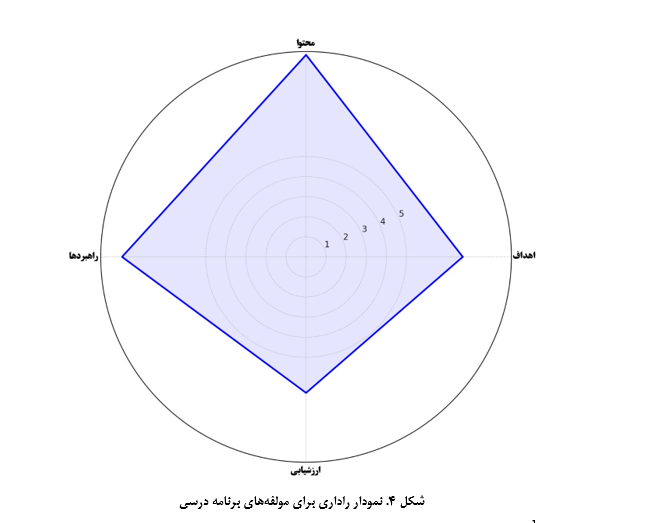Analysis of the Elements and Indicators of the Task-Based Curriculum Design Model in Primary Education: A Qualitative Approach
Keywords:
task-based curriculum, active learning, content flexibility, primary education, assessment and evaluationAbstract
This study aimed to examine and analyze the task-based curriculum in primary education. The task-based approach, which emphasizes active learning, content flexibility, and real-world connections, is recognized as one of the modern curriculum planning approaches. The research method was qualitative, and data were collected through content analysis of 12 primary education textbooks and semi-structured interviews with 15 teachers and curriculum planning experts. Data analysis was conducted in three stages: open coding, axial coding, and selective coding, resulting in the extraction of 150 initial codes, 12 main categories, and ultimately the identification of three key themes: "active learning," "flexibility," and "real-world connections." The findings revealed that despite the high potential of the task-based curriculum in promoting students' critical thinking and creativity, challenges such as a lack of resources, inadequate infrastructure, and insufficient teacher training were significant implementation barriers. However, opportunities such as the potential for localization and the use of modern technologies were identified, which could be effective in overcoming these challenges. Expert evaluations indicated that the component "teaching-learning strategies" received the highest approval with an average score of 4.6, while the "assessment" component, with an average score of 4.4, required revision. This study concluded that the task-based curriculum, with enhanced execution infrastructure and appropriate policy-making, can be an effective tool for improving learning quality in primary education.
Downloads
References
Abdelfattah F, Al Mashaikhya NY, Dahleez KA, El Saleh A. A systematic review of e-learning systems adoption
before and during the COVID-19. Global Knowledge, Memory and Communication. 2024;73(3):292-311. doi:
1108/GKMC-02-2022-0033.
Ajmi HRA. Principals’ Leadership Skills to Meet the National Strategy for Education in Basic Schools. Journal of
Education and E-Learning Research. 2024;11(2):413-21. doi: 10.20448/jeelr.v11i2.5644.
Bibi Y. E-Learning, an Emerging Trend in Education, the Concept, Importance, Benefits and Drawbacks. International
Journal of Research Publication and Reviews. 2024;5(2):1694-9. doi: 10.55248/gengpi.5.0224.0513.
Biggs J. Teaching for Quality Learning at University: What the Student Does: Open University Press; 2003.
Sahraei RM, Meydani F. Assignment-Based Curriculum: A New Approach to Strengthening Persian Language
Learning. Literary Text Research Journal. 2021;15(47):161-80.
Ebrahim-Abadi H. Corona and the Deconstruction of University E-Learning. In: Hossein M, editor. Essays on Higher
Education, Science, and the Corona Crisis in Iran. Tehran: Institute for Cultural and Social Studies Publications; 2020.
Azimi M, Ranjdoost S, Ebadi N. Curriculum Synthesis of Assignment-Based Curriculum in Nursing Education.
Journal of Nursing and Midwifery. 2020;18(1):69-83.
King PM, Kitchener KS. Developing Reflective Judgment: Jossey-Bass; 1994.
Harden RM, Davis MH. The Spiral Curriculum: Principles, Applications, and Implications. Medical Education.
;52(1):14-24.
Dewey J. How We Think: D.C. Heath & Co.; 1910.
Vygotsky LS. Mind in Society: The Development of Higher Psychological Processes: Harvard University Press; 1978.
Astriani Y, Nirwanto R, Qamariah Z. Task-Based Language Teaching Criteria in Textbook for Senior High School in
Indonesia. Jurnal Educatio Fkip Unma. 2023;9(1):191-7. doi: 10.31949/educatio.v9i1.4070.
Hill YZ, Tschudi SL. Exploring Task-Based Curriculum Development in a Blended-Learning Conversational Chinese
Program. International Journal of Virtual and Personal Learning Environments. 2011;2(1):19-36. doi:
4018/jvple.2011010102.
Taourite F, Cecilia RR. Perceptions and Application of Task-Based Language Teaching Among Primary School EFL
Teachers in Spain. Universal Journal of Educational Research. 2020;8(4):1289-98. doi: 10.13189/ujer.2020.080420.
Kirschner P, Sweller J, Clark R. Task Design and Cognitive Load in Primary Education. Journal of Educational
Psychology. 2019;55(2):145-67.
Ajmali S, Azimi M, editors. Effects of Assignment-Based Curriculum on Learning in Primary School Students2022;
Tehran.
Mansourian Y. Grounded Theory: Inductive Theory Construction Based on Real Data. Educational Issues Journal.
;Quarterly Research.
Naderi E, Seif Naraqi M. Research Methods and Their Evaluation in Humanities (with Emphasis on Educational
Sciences). Tehran: Arsbaran Publications; 2023.

Downloads
Published
Submitted
Revised
Accepted
Issue
Section
License
Copyright (c) 2024 Journal of Study and Innovation in Education and Development

This work is licensed under a Creative Commons Attribution-NonCommercial 4.0 International License.










